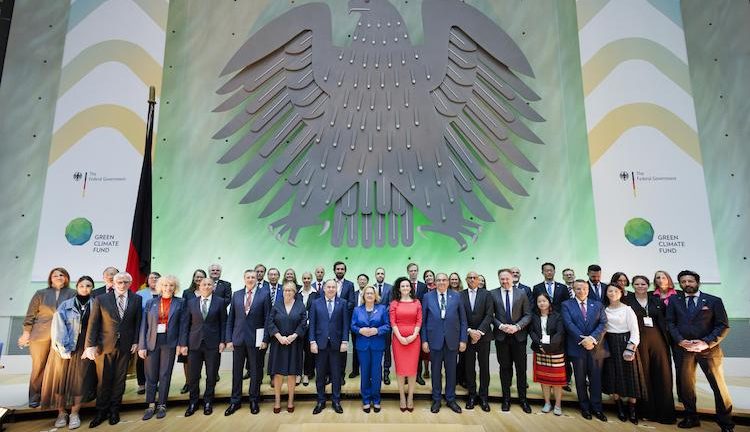By Ramesh Jaura
BERLIN | 9 October 2023 (IDN) — Twenty-five countries have pledged 9.322 billion US dollars for climate change mitigation and adaptation in developing countries. According to German government sources, further pledges for significant funding are expected before the 2023 UN Climate Change Conference convenes from 30 November to 12 December 2023 in Dubai.
Germany, Austria and France are among the countries that increased their commitment this year compared with the last pledging conference in 2019. Three countries (Denmark, Ireland and Liechtenstein) doubled their previous contribution.
The Green Climate Fund (GCF) will use the pledged funds between 2024 and 2027 to finance projects driving forward climate action and the energy transition in developing countries and emerging economies and will help developing countries particularly affected by climate change cope better with the impacts of global warming.
Germany sits on the Board of the Fund, a critical element of the historic Paris Agreement. From 2020 to 2023, Germany doubled its contribution to the GCF to 1.5 billion euros, putting it among the leading donors. It will increase its contribution again for the second replenishment of the GCF, which is currently underway to gather funding from 2024 to 2027. German Chancellor Olaf Scholz announced a sum of 2 billion euros.
Germany’s Development Minister Svenja Schulze said: “The October 5 High-level Pledging Conference for GCF’s second replenishment (GCF-2) sends a signal of solidarity: the world is standing together in the fight against climate change.”
Largest climate fund
It is the world’s largest climate fund, mandated to support developing countries in raising and realizing their Nationally Determined Contributions (NDC) ambitions towards low-emissions, climate-resilient pathways.
Since its inception in 2010 within the framework of the United Nations Framework Convention on Climate Change (UNFCCC) as an operating entity of the Financial Mechanism to assist countries of the Global South, the GCF has received around 19 billion US dollars in commitments.
Using this funding, it has been able to mobilise a total of 48 billion US dollars by way of cooperation with private and public sector partners. It is supporting 228 projects around the world. Roughly one billion people have already benefited from these projects.
Mr. Selwin Hart, Special Adviser to the UN Secretary-General and Assistant Secretary-General of the Climate Action Team, said the funding pledges received today enable the GCF to channel new, additional, and predictable financial resources to developing countries to support the paradigm shift towards low-emission and climate-resilient development pathways—mitigating 1.5 to 2.4 gigatonnes of carbon dioxide equivalent—and enhancing the resilience of up to 900 million people.
“Time is not on our side. And promises made must be promises kept. This is the only way to rebuild the trust needed to confront the climate crisis,” he added.
“As we approach COP28 and look beyond, we will redouble our efforts to support the vulnerable, unlock private capital, drive efficiency, and enable transformative climate action where it is needed most. To the nations that have yet to pledge, and which I’m confident will, we stand ready to welcome you into the fold as we jointly pursue lasting structural change,” said Mafalda Duarte, Executive Director of the Green Climate Fund.
Supporting vulnerable people
The Fund said in a press release that it would deploy its financial resources, continue to grow its 200-plus strong partnerships, build its convening power and knowledge to intentionally invest in the world’s most vulnerable communities—with a focus to maximize private sector investment and coalesce multiple partners and investments behind singular, country-led initiatives. According to the Fund, the investments it supports are already transforming lives in 129 developing countries:
Vulnerable people supported in the Least Developed Countries (LDCs), Small Island Developing States (SIDS), African states, and fragile and conflict states—including Afghanistan, Eritrea and Yemen.
“Hardest to Reach” project providing affordable and green energy access to first time users in low-income populations in 16 countries across Africa, including Somalia.
Enhancing the climate resilience and livelihoods of indigenous peoples, including the indigenous wetlands communities in Peru – reducing greenhouse gas emissions from deforestation.
Strengthening food security by supporting pioneering and early-growth agribusinesses of smallholder farmers, including in Ghana, Kenya, Nigeria and Uganda.
Building the resilience of water supplies for communities, including in Vanuatu.
“As we head toward the Conference of the Parties on Climate Change (COP28) today’s commitments demonstrate, in a world with multiple competing crises, there is full recognition that climate is the one that affects everyone on the planet,” noted an observer. [IDN-InDepthNews]
Photo: Group picture of conference participant. Credit: Global Climate Fund.
IDN is the flagship agency of the Non-profit International Press Syndicate.


